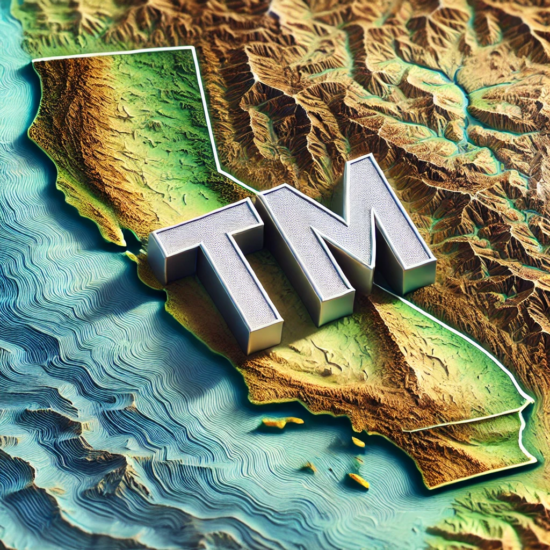
Need to protect your business name or logo within California? This article outlines the California state trademark registration process, including its legal framework, benefits, and the steps required to successfully protect your trademark rights. It also highlights practical considerations, such as conducting a thorough search, selecting the correct classification, and handling the registration process. Whether you’re a new entrepreneur or an established business, understanding state trademarks is necessary to enable you to protect your business and brand.
Trademarks are a form of intellectual property that protects the source of a particular good or service from imitators that would either intentionally or unknowingly trade on the reputation associated with the source of goods or services (the trademark owner). A California state trademark is specifically designed for local businesses that operate solely within the state. Unlike federal trademarks, which provide nationwide protection, California state trademarks are limited to the geographical boundaries of California. This type of trademark serves as a powerful tool for identifying and distinguishing products or services within the local market.
Registering a California trademark offers significant legal protections against unauthorized use by competitors within the state. For many California businesses, especially those that focus on local commerce, state trademarks provide a cost-effective way to secure their brand identity.
Moreover, the California Trademark Unit manages registrations for specific types of trademarks, including container brands and estate names, ensuring a tailored approach for different business needs. While state trademarks are not as far-reaching as federal trademarks, they still offer robust protections and can be a crucial asset for businesses operating within California.
The legal framework for California state trademarks is outlined in the Model State Trademark Law under California Business and Professions Code Sections 14200-14272. These laws provide the foundation for trademark rights and protections within the state. While rights to a trademark arise from its use in commerce, registering the trademark is governed by the CBP code, which provides additional legal protections and formal recognition.
Registering a California state trademark comes with a host of benefits that can significantly impact your business. The costs are lower. With a state registration fee paid to the California Secretary of State's office is $70, considerably less than the approximately $350 filing fee for federal registration. There is also a simpler application process than at the federal level. The application is examined by the California Trademark Unit for formalities, such as descriptiveness, specimen of use, and properly identified goods. There is no in-depth search for confusingly similar marks. If the exact mark is not previously registered with the state, then it is very likely that you will be able to register the mark if the formal requirements are met. Thus, if you have engaged a trademark attorney to handle the application, the attorney's fees will be significantly less for a California trademark application because there is generally less to do in the examination process. The process of state trademark registration is straightforward and less cumbersome compared to the federal registration process, making it a lower cost option for businesses focused on local commerce.
The registration process for a California trademark is generally faster than for federal trademarks. Often completed within weeks, this quicker turnaround means businesses can secure their trademarks and start reaping the benefits much sooner. Once registered, your trademark becomes a matter of public record, enhancing your brand’s visibility, and providing a formal record of your claim of ownership.
Another significant benefit is the exclusive rights to use the trademark within California. This exclusivity helps prevent competitors within the state from using similar marks, thereby protecting your brand’s identity and market position.
Registering a California state trademark involves several steps, including conducting a thorough trademark search, preparing a proper specimen of use, correctly identifying the classification of goods, and correctly filling out and submitting the application forms to the California Secretary of State. Each of these steps is essential for successfully registering a trademark in California, which are discussed in more detail below.
Before you can register a trademark in California, it is important to conduct a thorough trademark search. This step ensures that your proposed trademark is not confusing to other similar trademarks registered with the United States Patent and Trademark Office (USPTO) or that are otherwise in use by third parties and thus does not infringe on the rights of others. It is not enough to simply use the California Secretary of State’s trademark search tool. This only tells you whether your mark has been registered with the state. Most registered trademarks and service marks in use in California are either federally registered or unregistered. In order to avoid potential conflicts, your trademark search needs to be broader than just the California state trademark search tool. We recommend seeking the assistance of an experienced trademark attorney to properly vet your trademark or service mark before you file a trademark application. You do not want to waste your funds on an application that is invalid and that creates a public record that you are engaging in trademark infringement.
Selecting the correct classification is absolutely necessary for the registration process. Trademarks are categorized based on the goods or services on which they are used. A trademark protects goods, whereas a service mark is specifically designed to protect services. Goods and services are classified separately based on their relatedness. There are 45 classifications set by the United States Patent and Trademark Office that the Secretary of State's office has adopted. If you mark is used on different types of goods and/or services, your trademark application may include multiple classifications. Choosing the wrong class can result in the inability to register your trademark. Each classification for which you seek registration comes with a $70 filing fee. Carefully reviewing the classifications and selecting the one that best fits your business’s goods or services is critical.
Preparing your California trademark application involves several key steps. The primary form used for this process is the TM-100. You must have begun use of your trademark before you can seek a trademark registration in California. California Business Professions Code Section 14207 requires that a trademark must be in use and a specimen of such use must be submitted in the application before a California trademark registration can be issued. This contrasts with the federal trademark registration process, in which you can file an intent-to-use application if you a bona fide intent to use trademark or service mark in the future.
The specimen of use is required to demonstrate how the trademark is being used. This can include photos of the product, marketing materials, or screenshots of your website. Your application may need a particular type of specimen depending on the nature of your goods or services.
There are a number of other formal requirements in the application, including the date on which actual use of the trademark began, the designated owner of the mark (you personally or your business entity), and a declaration that the applicant is the owner and that the applicant is not aware of any third party that has a registered mark or the right to use a mark that is confusingly similar to the applied-for mark. You must provide accurate details about your trademark and declare the truthfulness of this information under the risk of criminal penalties for false statements under the California Business and Professions code.
Once your application is prepared, you can file it with the secretary of state’s office. This can be done online through the California Secretary of State Bizfile Portal, in person at the Sacramento office of the Secretary of State, or by mail. The date of receipt of your application establishes its priority as of the date and time of the submission, so timely submission is crucial.
Declaring the accuracy of your application details is important, as false statements can result in penalties of up to $10,000. Because there are significant legal implications in the filing the trademark or service mark application, it is highly recommended that you seek the assistance of an attorney before filing the application.
During the registration process, you may receive an office action—a notice from the Secretary of State's office about issues with your application, which are limited to formal issues. Responding promptly and accurately to these office actions is essential, as failing to do so can result in your application being abandoned.
The issues raised in such office actions almost invariably regard compliance with the requirements of section 14207 of the California Business and Professions Code. They are not complicated issues, but they can be difficult for the layperson to address. Seeking guidance from a licensed California trademark attorney can greatly increase your chances of success. Additional fees may be incurred, but you will likely succeed in registering your mark with proper assistance.
After successfully addressing any office actions, your registration may issue. The process usually lasts no more than a few weeks before you receive your registration certificate, officially marking your trademark as registered in California. Subsequently, you will be required to maintain the registration by filing renewal applications every five years.
Maintaining your California state trademark requires an ongoing effort. Registrations are valid for five years and must be renewed to remain active. Renewal involves submitting the necessary documentation to demonstrate the ongoing use of the trademark in commerce.
Failing to renew your trademark on time can lead to its cancellation, requiring a complete reapplication process. Continuous commercial use is crucial to avoid abandonment and maintain your trademark rights.
Additionally, monitoring your trademark to prevent unauthorized use by competitors is essential for long-term brand protection. If you allow third parties to use confusingly similar trademarks without taking action, you will lose exclusivity and your trademark rights will be eroded. If your brand has value it is important to police the marketplace for unauthorized use and enforce your trademark rights when necessary.
Registering cannabis-related trademarks in California is possible, which contrasts with federal trademark law and policy. This allows businesses in the cannabis industry to protect their brands within the state, despite federal limitations.
However, cannabis-related trademark registrations and the legal implications of such filings are delicate topics and should be approached with caution. It should be remembered that cannabis is still outlawed under the federal Controlled Substances Act. Consulting with a trademark attorney who specializes in this area can provide valuable guidance and ensure compliance with state regulations.
Understanding the difference between the TM and ® symbols is crucial for trademark owners. In California, you can use the TM symbol to indicate that you claim rights to your trademark, even if it is not federally registered.
The ® symbol can only be used after your trademark is federally registered. Only a federal trademark registration allows for the use of the ® symbol.

Registering a state trademark in California offers specific advantages for many businesses. If your business operates solely within California, federal registration may not be an option. However, a state trademark provides significant protections. Additionally, state registration often involves fewer restrictions and a quicker, more affordable process.
State trademarks are particularly beneficial for businesses involved in industries like cannabis, where federal registration may not be feasible. A California state trademark also provided protections under California law in addition to applicable sections of the Lanham Act (federal trademark law) and provides a public record of your trademark rights within the state.
Registering a California state trademark is a strategic move for businesses operating within the state. It offers cost-effective, robust legal protections and enhances brand visibility. To register a California state trademark, businesses must use the mark in commerce, conduct a thorough trademark search, and correctly prepare the application and navigate the application process. The benefits of a California state trademark extend beyond legal protection; they reinforce your brand’s presence and value within the local market.
If you are considering pursuing a trademark registration, contact our office for a free consultation regarding trademark registration.
© 2024 Sierra IP Law, PC. The information provided herein does not constitute legal advice, but merely conveys general information that may be beneficial to the public, and should not be viewed as a substitute for legal consultation in a particular case.

"Mark and William are stellar in the capabilities, work ethic, character, knowledge, responsiveness, and quality of work. Hubby and I are incredibly grateful for them as they've done a phenomenal job working tirelessly over a time span of at least five years on a series of patents for hubby. Grateful that Fresno has such amazing patent attorneys! They're second to none and they never disappoint. Thank you, Mark, William, and your entire team!!"
Linda Guzman

Sierra IP Law, PC - Patents, Trademarks & Copyrights
FRESNO
7030 N. Fruit Ave.
Suite 110
Fresno, CA 93711
(559) 436-3800 | phone
BAKERSFIELD
1925 G. Street
Bakersfield, CA 93301
(661) 200-7724 | phone
SAN LUIS OBISPO
956 Walnut Street, 2nd Floor
San Luis Obispo, CA 93401
(805) 275-0943 | phone
SACRAMENTO
180 Promenade Circle, Suite 300
Sacramento, CA 95834
(916) 209-8525 | phone
MODESTO
1300 10th St., Suite F.
Modesto, CA 95345
(209) 286-0069 | phone
SANTA BARBARA
414 Olive Street
Santa Barbara, CA 93101
(805) 275-0943 | phone
SAN MATEO
1650 Borel Place, Suite 216
San Mateo, CA, CA 94402
(650) 398-1644. | phone
STOCKTON
110 N. San Joaquin St., 2nd Floor
Stockton, CA 95202
(209) 286-0069 | phone
PORTLAND
425 NW 10th Ave., Suite 200
Portland, OR 97209
(503) 343-9983 | phone
TACOMA
1201 Pacific Avenue, Suite 600
Tacoma, WA 98402
(253) 345-1545 | phone
KENNEWICK
1030 N Center Pkwy Suite N196
Kennewick, WA 99336
(509) 255-3442 | phone
2023 Sierra IP Law, PC - Patents, Trademarks & Copyrights - All Rights Reserved - Sitemap Privacy Lawyer Fresno, CA - Trademark Lawyer Modesto CA - Patent Lawyer Bakersfield, CA - Trademark Lawyer Bakersfield, CA - Patent Lawyer San Luis Obispo, CA - Trademark Lawyer San Luis Obispo, CA - Trademark Infringement Lawyer Tacoma WA - Internet Lawyer Bakersfield, CA - Trademark Lawyer Sacramento, CA - Patent Lawyer Sacramento, CA - Trademark Infringement Lawyer Sacrament CA - Patent Lawyer Tacoma WA - Intellectual Property Lawyer Tacoma WA - Trademark lawyer Tacoma WA - Portland Patent Attorney - Santa Barbara Patent Attorney - Santa Barbara Trademark Attorney